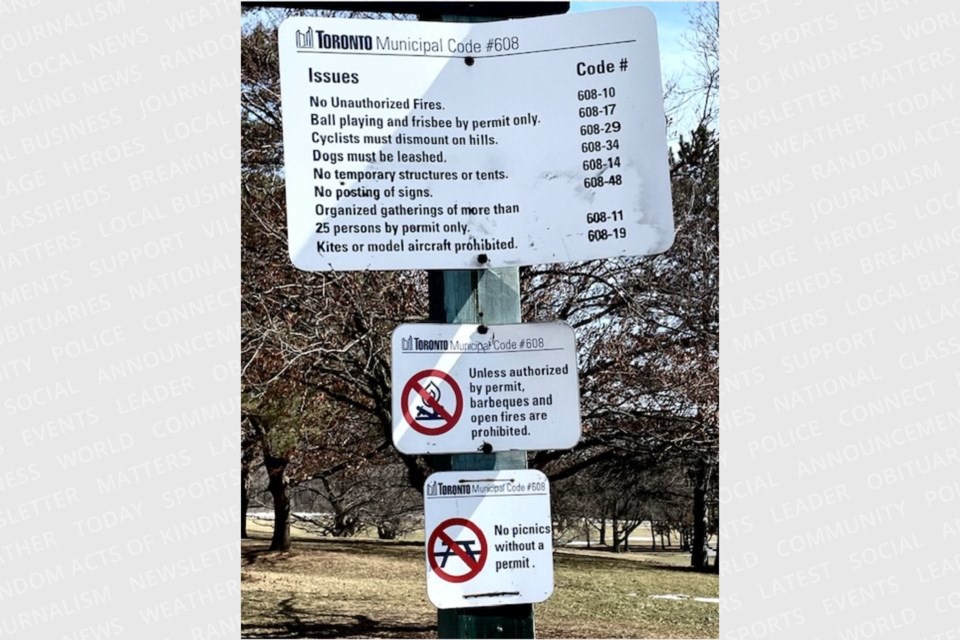TORONTO - Weird, unnecessary and draconian: these are some of the words one city councillor used to describe Toronto’s most restrictive park bylaws.
Residents who don’t make a habit of reading city bylaws may be surprised to learn that climbing trees, using “profane” language and gathering more than 25 people without a permit are all prohibited under the municipal code governing Toronto’s parks.
Coun. Josh Matlow (Toronto-St. Paul’s) wants to see this change. He told TorontoToday he will be requesting city council to review Toronto’s park bylaws, with the aim of creating a more realistic set of rules.
“I was reading the park bylaws, wondering ‘Is this satire?’” he said.
The city’s parks are also governed by a suite of hyper-specific — though potentially necessary — bylaws, like bans on residents landing hot air balloons or operating model airplanes.
Matlow was inspired by a photo a resident sent him of the bylaws posted at Sunnybrook Park in Leaside. The list includes a ban on playing with balls and frisbees without a permit, as well as flying kites, and orders cyclists to dismount on hills.
“Just these ridiculous things that don't make any sense,” Matlow said.
Some of Toronto’s park by-laws are truly bizarre & need to go. Along with requiring a permit to throw a frisbee, there are by-laws that prohibit kids from climbing trees & make a point of banning us from cursing or landing a hot air balloon in a park- there goes my Sunday plans:) pic.twitter.com/QFRZIY3tXZ
— Josh Matlow (@JoshMatlow) March 30, 2025
While kite-flying isn’t prohibited in all Toronto parks, city bylaws allow for kites to be restricted where posted.
As for playing with balls and frisbees, when TorontoToday asked the city why these activities required a permit at this park, city staff confirmed the bylaw in question “is meant to refer to organized sports or activities,” not individual play. However, the sign itself makes no mention of organized sports.
While some who have never faced a bylaw enforcer may not see the use in updating Toronto’s park rules, Matlow pointed to a greater equity issue at stake.
“There are a lot of people who will look at some of the bylaws like you’re not allowed to climb a tree or you’re not allowed to congregate in a party over 25 people without a permit and go, ‘Oh that’s silly. Of course I’m going to let my kids climb the tree.’ But, for example, if you’re a person who is racialized or new to the country… you don’t have a sense of entitlement to just ignore those rules,” he said.
That’s why it’s important to create bylaws that “make sense,” Matlow said.
For example, before Toronto began allowing residents to drink alcohol in some public parks, Matlow said he would hear stories of drinking rules being applied selectively.
“If you are white and middle class, you probably never experienced a bylaw enforcement officer come up to you and tell you to get out of a park because you're having a glass of wine,” he said. “But if you are a young person of color, or if you're somebody of lower economic means, you may well have had that experience.”
When bylaws are realistic, everyone can feel free to enjoy the city’s parks to the fullest, Matlow argued.
The councillor plans to bring a motion to the next city council meeting on April 23 to ask city staff to review Toronto’s park bylaws and report back with recommended changes.
“It's time to review them and make sure that the ones we keep actually are helpful, and get rid of the ones that are redundant, ridiculous or discriminatory,” he said.





